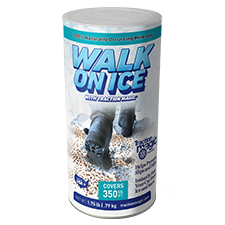Should I Install A Concrete Driveway Or Asphalt Driveway?

When you are building new premises or renovating the old ones, your search for the paving material ends up with the choice between Concrete or Asphalt. Although the base material for both is prepared with sand and stone, the adhesive used for asphalt is tar and cement for concrete. However, these fundamental differences are not enough to decide if one should install a concrete driveway or an asphalt driveway.
Other differences are related to the cost involved, design, and maintenance. Moreover, you have to think about the right product to melt ice. For example, is calcium chloride ice melt for concrete safe, or is there any safe ice melt for concrete and asphalt?

Here is an analysis to choose the most suitable material for your driveway and the safe ice melt solution.
1. Installation Cost
Typically a concrete driveway costs 50% more than an asphalt driveway. Where an asphalt driveway costs $2 -$4 per square foot, the concrete driveway may cost from $3 to $6 per square foot.
2. Design And Visual
Most owners wish to have a nice look at the driveway and want to stain, tint, color, and stamp the driveways, which is possible on concrete material only, which is why it becomes more costly. Whereas asphalt material doesn’t have scope for design and color as it must be rolled and compressed during installation.
3. Durability
Where a concrete driveway can last for 30 – 40 years with regular maintenance, an asphalt driveway will last 20 – 30 years only.
4. Weather Effect
The climate and weather of your region will also affect your decision. Because in winters, concrete gets cracks from constant freezing and thawing of ice and snow, and the chloride-based ice melts will damage the concrete surfaces. While the region with hot climates affects asphalt driveways by softening the material, and it becomes sticky in shoes and vehicle tires.
5. Maintenance And Repairing
Where an asphalt driveway needs to be sealed in the first year of the installation and needs resealing every five years to maintain and extend the driveway’s life, a concrete driveway doesn’t require so much maintenance unless resealing is done for a new look and maintenance.
Cracks are a common problem in both kinds of driveways. However, asphalt cracks cost more to fix compared to concrete cracks.
Is Calcium Chloride Ice Melt For Concrete Safe?
In cold regions, driveways need extra care during winters to protect them from cracks during the freeze/thaw process as chloride-based products like Sodium Chloride, Magnesium Chloride, and Calcium Chloride may harm your concrete driveways by corrosion and cracks on it.
Safe Thaw: A Safe Ice Melt
Safe Thaw is a urea-based one of the concrete safe ice melt at Walmart. It does not contain any residues of chloride or salt; instead, it has a safe formula consisting of a modified crystalline amide core, unique glycol admixture, and traction components.
These patented dual-effect ingredients are neither corrosive nor pose any conductivity threat. Hence, there is no risk of short circuits, and it doesn’t hurt your valuable machinery and vehicles. Moreover, it is a good choice for your business as it has a long shelf life.
100% salt & chloride-free, fast acting Ice Management Solution
Conclusion
The two materials, concrete, and asphalt are both suitable for different requirements; you can use the above analysis to choose one based on your design preference, cost, weather, etc. Moreover, don’t forget to get a salt-free ice melt for your driveway. You can get this concrete-safe ice melt at Walmart and other stores offline and online.
Try Also Our Other Winter Safety Products:
Safe Paw
The Original and #1 Selling Pet and Child Safe Ice Melt for over 20 years. Guaranteed environmentally safe –It won’t harm animals or children, and it won’t damage your property. That’s Safe Paw. Safe Paw can change how winter affects our planet.

Walk On Ice
The handy disposable canister can be taken everywhere, with the same 100% naturally occurring minerals that provide instant traction on ice or snow. Use it on sidewalks, steps, or as an instant traction agent for your car.


